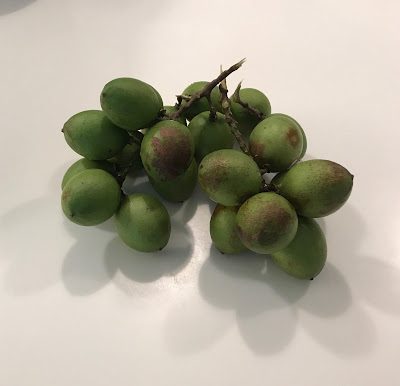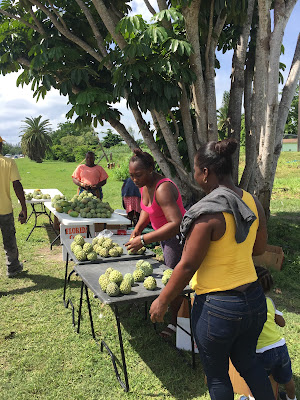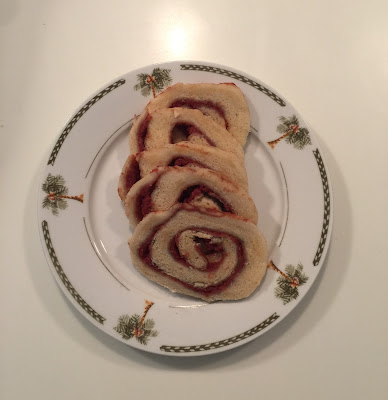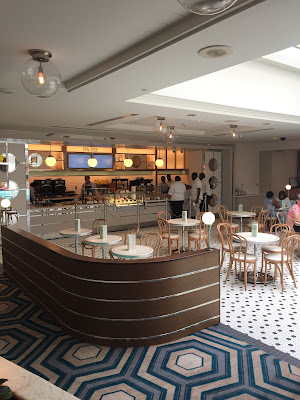 |
| This Bahamian fruit looks like grapes on the outside, like lychee on the inside. |
"They call it keneps," said my Filipina friend Amy who's been living on the island for a decade now. She wasn't sure about the spelling so I also asked my Bahamian friend about it.
"That's guinep," Danielle said. Google tells me both spellings are correct. The Bahamian fruit, rich in nutritional value, is also commonly known as the Spanish lime. It is native to the Caribbean islands as well as in South and Central America. Depending on the locale or region, it is known by different names ranging from "quenepas," "mamoncillo," to "huaya" or "ackee."
I was thrilled when Alan came home one day toting a clear plastic bag with a small bunch of the local fruit. I thought he might have encountered a street vendor on the drive home, but he told me it came from his co-worker. The same gracious co-worker even demonstrated how to properly consume it.
"She was just dying to have one of these," he pinched a single guinep. "She begged to show me how to eat it," he laughed and replicated the tutorial for my sake.
He started by gently biting the shell to crack it open. Inside, the almost-orange pulp looks like a thin film covering a large seed. It resembles the inside of a lychee or the Philippine rambutan.
Just like he would with a sweet and sour candy, he sucked on the fleshy part of the pulp, leaving the seed clean. It's tart and tangy, reminiscent of grapes. It tastes even better when refrigerated.
 |
| The kenep or guinep, its inside, and its seed |
Bit by bit, I'm discovering that Bahamas grows several of my favorite Philippine fruits, including those that I haven't had in years! One of them is the sugar apple, which Filipinos call "atis."
 |
| The sugar apple or what I call "atis" |
I spied them on our way home from the mall one weekend. A group of locals were stacking the sugar apples on their pop-up stand, under a big shade tree. My eyes grew wide. "They have atis here!" I couldn't believe it and I was elated. I've missed its sugary taste. Alan quickly pulled over so I could get my fill.
 |
| Pop-up stands and roadside vendors selling sugar apples |
Just the other day, Alan brought home another delicious surprise: the guava duff. It reminded me of a jelly roll. The dough is cake-like and the jelly is made with guava (also known to Pinoys as "bayabas.") The best way to enjoy guava duff is to drizzle it with a special rum or brandy butter sauce. Heated, of course. It's heavenly. I looked over the recipe. Preparing this traditional Bahamian delicacy involves a tedious process. But the results are rewarding.
 |
| Guava duff minus the brandy butter sauce |
Another fruit also available here is the soursop, which is called "guyabano" in the Philippines. I relished the taste from a homemade popsicle. I picked the soursop flavored treat while promenading at the Atlantis' Marina Village.
Just this summer, Atlantis Paradise Island opened Sun & Ice, a new ice cream parlor that puts a spotlight on the indigenous fruits of The Bahamas. The brand new venue at The Coral Towers' lobby looks as refreshing as the local fruit-infused flavors of ice cream, gelato, and sorbet offerings.
 |
| Local ice cream flavors at Sun & Ice inside Atlantis |
 |
| The new Sun & Ice gelato shop at Atlantis Paradise Island |
 |
| Diner style seating at Atlantis' ice cream shop, Sun & Ice |
 |
| Gathering spots around the new ice cream shop, Sun & Ice |
I walked up to study the labels on the ice cream display. My interest was piqued by one of the flavors.
"What is sapodilla?" I asked the lady behind the counter.
"It's Bahamian," she answered.
"Right. But what is it? Is it a fruit?" I wanted to learn more.
"Yes, it's a fruit."
Well, that didn't really satisfy my curiosity so I consulted good ol' Google again. To my surprise, I saw photos of a familiar brown-colored fruit with shiny black seeds. Aha! Sapodilla to The Bahamas is "chico" to Pilipinas.




No comments:
Post a Comment